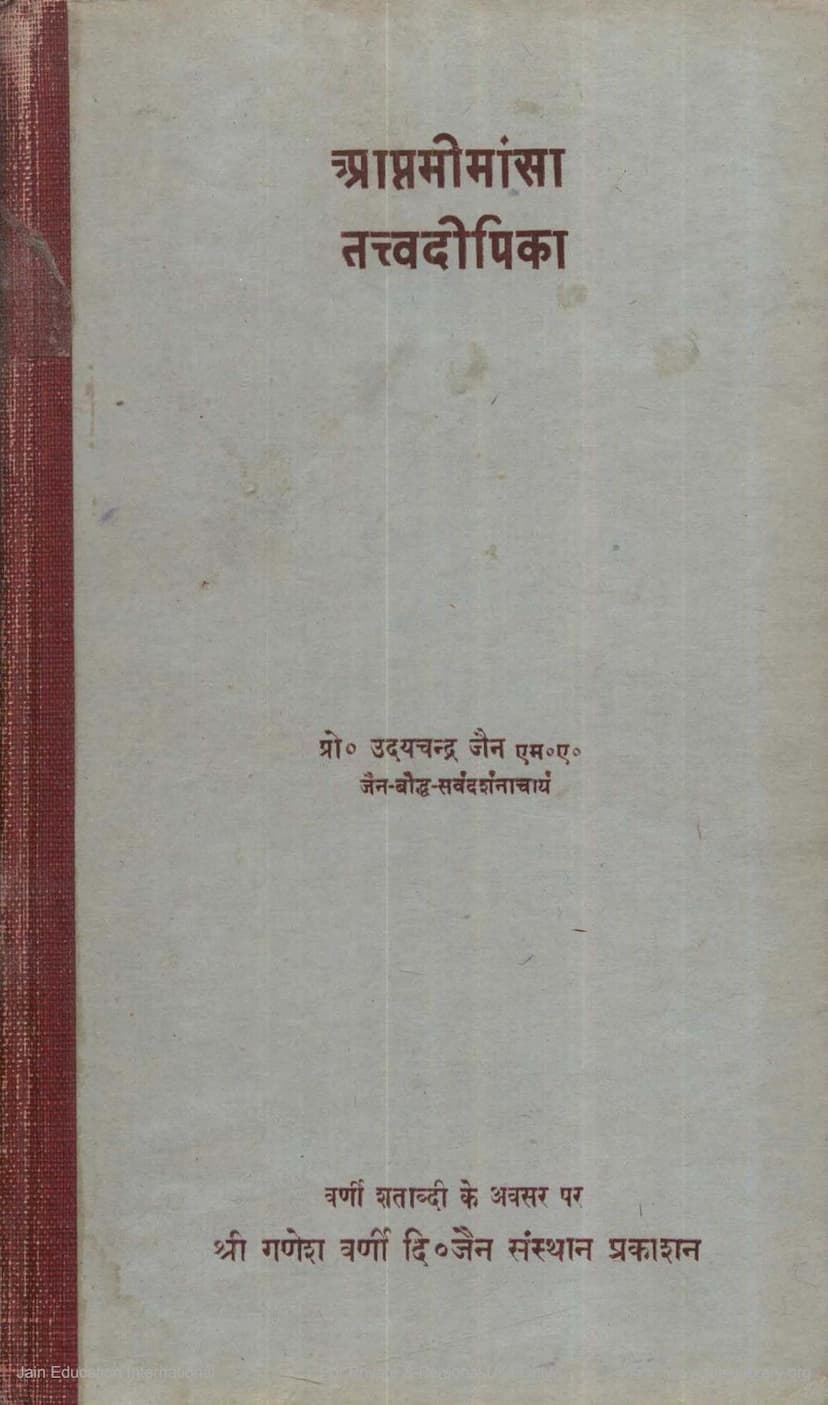Aptamimansa Tattvadipika
Added to library: September 1, 2025

Summary
The book "Aptamimamsa Tattvadipika" is a Hindi commentary on the Aptamimamsa of Acharya Samantabhadra, authored and edited by Prof. Udayachandra Jain. Published by Shree Ganesh Varni Digambar Jain Sansthan, Varanasi, it was released on the occasion of the Varni Centenary.
Key Aspects and Content:
-
Commentary on Aptamimamsa: The core of the book is Prof. Udayachandra Jain's elucidation of Acharya Samantabhadra's seminal work, the Aptamimamsa. The Aptamimamsa itself is a critical examination of the concept of an "Apta" (an authoritative person or source of knowledge) within the context of various Indian philosophical schools.
-
Author's Expertise: Prof. Udayachandra Jain is presented as a highly qualified scholar, holding Acharya degrees in Jain Darshan, Bauddha Darshan, and Sarva Darshan, along with being a Siddhantashastri and Nyayatirtha. He has extensive experience teaching Buddhist philosophy at Banaras Hindu University.
-
Scholarly Approach: The commentary is noted for its depth and clarity, drawing heavily from the Sanskrit commentaries of Acharya Akalanka (Ashtashati) and Acharya Vidyananda (Ashtasahasri) on the Aptamimamsa. Prof. Jain also integrates insights from other Indian and Western philosophical systems to provide a comprehensive understanding.
-
Focus on Jain Principles: While examining Aptamimamsa, the book highlights and establishes core Jain philosophical tenets such as Syadvada (the doctrine of manifold predications), Anekantavada (non-one-sidedness), Saptabhangi (the sevenfold logic), and Nayavada (the theory of standpoints).
-
Inclusion of Supporting Works: The book features valuable introductory and evaluative materials from prominent scholars:
- Valuation (Mulyankan): By Bhikshu Jagdish Ji Kashi (former Director of Nalanda Mahavihara).
- Preface (Prakathana): By Pt. Kailashchandra Ji Shastri (Dean of Shri Syadvad Mahavidyalaya).
- Foreword (English): By Dr. Ramakant Ji Tripathi (Professor & Head, Department of Philosophy, BHU).
- Shubhashasan (Sanskrit): By Pt. Kedarnath Ji Tripathi (Head of Philosophy Dept., Faculty of Oriental Learning & Theology, BHU).
- Purovak (Sanskrit): By Pt. Jagannath Ji Upadhyay (Head of Pali Dept., Sanskrit University).
-
Dedication and Context: The work is dedicated to the revered memory of Param Tyagi, Adhyatmik Sant Shri 108 Ganesh Varni Maharaj on his birth centenary. It emphasizes his significant contributions to Jain culture, including the establishment of Shri Syadvad Mahavidyalaya and his deep respect for his gurus.
-
Detailed Table of Contents (Granthanukram): The book includes an extensive index covering various aspects:
- Praise for Samantabhadra (Samantabhadra-stavan).
- Dedication and acknowledgments.
- Biographies/introductions to Acharya Samantabhadra, Acharya Akalanka, and Acharya Vidyananda.
- Analysis of Samantabhadra's philosophical contributions (omniscience, soul, categories, Syadvada, universal upliftment).
- Detailed discussion of core Jain philosophical concepts: Pramana (Epistemology), Nayavada, Anekantavada, Syadvada, and Saptabhangi.
- Review of other philosophical systems (Jain, Buddhist, Sankhya, Nyaya, Vaisheshika, Mimamsa, Vedanta, Charvaka, Tattvopalavavada, Vainayika).
- Specific analysis of Sarvajna (Omniscience) and its refutation/establishment.
- Indices for quotations, key Sanskrit and Jain terms, and source materials.
-
Author's Intent: Prof. Udayachandra Jain's goal was to clarify the complex philosophical elements of the Aptamimamsa, making them accessible to Hindi readers by drawing upon the deeper explanations found in Ashtashati and Ashtasahasri. He aimed to bridge the gap for those unfamiliar with Sanskrit philosophical literature.
In essence, "Aptamimamsa Tattvadipika" is a significant scholarly work that meticulously explains a foundational Jain text, making its profound philosophical arguments, particularly concerning epistemology and the nature of truth (Syadvada), accessible to a wider audience through detailed commentary and the insights of leading contemporary scholars.